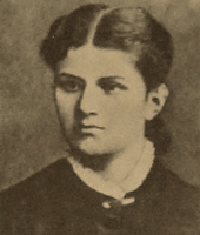
1851 – 1938
Ekaterine Gabashvili was born in Gori on 28 June 1851. Her father, Revaz Tarkhnishvili, (Tarkhan-Mouravi) was a court secretary and then a defense lawyer. He belonged to the liberal nobility.
In 1859, Ekaterine Gabashvili was taken first to German school in Tbilisi and then to a famous Madam Favre’s boarding school. In 1868, Ekaterine Gabashvili returned to Gori and conducted a pedagogical activity. She taught reading and writing to poor children for free. In Gori she wrote her short story “A Village Teacher.”
After marrying Aleksandre Gabashvili she moved to Tbilisi and engaged in active literary and public activity. She was a board member of the Society for the Spreading of Literacy Among Georgians; led a vocational educational institution for women; assisted poor female students in obtaining general education along with professional training.
Ekaterine Gabashvili was a founding member of the women’s’ society of Tbilisi; a co-founder of Jejili magazine along with Anastasia Tumanishvili-Tsereteli and an active employee of the magazine.
To Our Women
Author: Ekaterine Gabashvili
“Each nation, each educated, happy and free people have armies of women engaged in charity activities, who assist the feeble, point the path to disoriented, provide knowledge to ignorant, open eyes to blind and if not completely, at least, as much as possible perform the teaching of the greatest philanthropist – Christ: I was hungry and you fed me, I was thirsty and you gave me drink, I was alien and you gave me shelter, I was naked and you dressed me, I was ill and you cured me, et cetera.
“If this is the case in a happy and free nation, if the whole army of women tirelessly work and exude warmth around them there, does our feeble, disoriented and opressed nation not need such women?
“A bunch of Germans, owing to the charity of their women, operate a house for elderly in Tbilisi. They also operate a working house to provide jobs to indigent; have several schools; storages of clothes to provide the poor in cold winter; a treating facility for diseased poor! Such entities are also operated by Jews, French, Armenians.
“What about us? What do we own? Should we always be beggars of others everywhere, pin hopes on others’ assistance?
“Every reasonable Georgian’s hair will stand on end when seeing administrators of our school for nobility compiling the list of parents of indigent children, come to the door of school in autumn, describing the pictures of their barefooted children.
“Let alone those poor young females who lacking education, seek jobs in great amounts and feel themselves disoriented in this ambiguous city, and often feeling despair in searching the living through honest labor, get to be hired, sold.
“Female representatives of our nobility and affluent society spent all their time, all their wits and their entire capabilities on coquetry, entertainment, playing cards, and this empty, vain and unproductive life of theirs is no satisfaction to anyone, even to their own minds and hearts.
“Is it not better for them follow the example of noble women of other nations and to contribute one hundredth of their income to charity, spend one hundredth of their time on the care for the poor! Will feeding hungry, rearing an orphan, pointing the way to disoriented, taking care of the feeble not be the nourishment for their empty hearts, their hollow souls of which these our idle, reasonless and mindless woman are definitely aware.
1) We need a women’s association at the school for nobility to assist the students.
2) We need to establish a women’s association at the Society for the Spreading of Literacy Among Georgians.
3) There is a need for female jobs at workshops.
4) There is a need of a drama society and many other jobs.
“It is high time to speak out and do something in joint effort in order to awaken, to identify the ideal and set a society to pursue this ideal. Only those people who are equipped with ideal have enlightened minds, delicate souls and generous hearts.
“So, women! Let us engage in the striving for a common cause; make obligatory to spend just several days a year on performing public service, taking care of good and bad, gradually, step by step but resolutely and steadily fight against poverty and shape our destiny ourselves.”
The newspaper Iveria, issue # 100,
15 May, 1898

